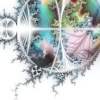Early 2000 and I was in London and a newly promoted manager within Arthur Andersen, Business Consulting division. During some new-manager training, we were encouraged to develop our own personal mission statement. I’d never considered such a thing before then. Business mission statements have always felt hollow to me (still do - more about marketing than actual values).
Across the next week I let my mind bring to light what was important to me. I remember working on it lying on a blanket in Wandsworth Park, London adding to my Palm V. I don’t recall where I was for anything else I’ve written in life.
With only minor tweaks since then, this is the reasoning behind My Mission Statement.
The behaviour and decisions in my life are made in accordance with this mission statement; the essence of which is grounded in the principles of truth, beauty, goodness and unity.
I’m a big fan of Tom V. Morris as a modern-day philosopher. His book If Aristotle Ran General Motors1 talks about the four principles of truth, beauty, goodness and unity and I found that compelling. I thought that even something as apparently unworthy as software code is something wonderful when it fits these four principles. When my life is going well, at least one of these principles is in play.
I help people take powerful action to enrich their lives.
I am joyous when I’m able to help others advance their lives through knowledge and experience I have been able to share with them. I have long been an educator and my last 10 years at work has been driven by helping others do their job better which I don’t see diminishing; though the how will change.
I am responsible for my feelings, attitude and actions at all times.
This is a tough one to live up to. We all know how easy it is to externalise and blame others for the way we feel. Accepting that every decision I’ve ever made is the reason I’m where I am in life can sometimes be a bitter pill.
I treat all others with respect, dignity, love and integrity; as I expect to be treated myself.
My personal version of the Golden Rule. We can easily do damage when we fall into thinking of others as objects and not legitimate human beings2. If I were to change this, I’d add something about me treating myself the same way.
I draw on an internal well of fortitude to give strength to myself and others in time of need.
I use this as a reminder not to give up easily. Sometimes, as occurred recently, I can go to far and tap that well dry. Fortitude does not mean I do everything myself. When I need help and it’s hard to ask for, I draw from the well to make the request.
I inspire and lead through example.
Is there any other way than by example? Oh yeah, force, intimidation, shaming, etc. Not for me. I’d rather be a positive example. I subscribe to the idea that leadership is creating a world other people want to belong to.
I leave each day a better person than I entered it. As a scholar of life I continually learn and improve myself. Where I lack wisdom or knowledge I seek it out.
I love learning about how I live my life. To me, it’s the best kind of learning I can do. The use of “scholar” is deliberate. It doesn’t speak to any academic qualifications, but reinforces my mindset and approach. Emanuel Vogel Gerhart describes a scholar as, “[A] scholar [is one] whose whole inward intellectual and moral being has been symmetrically unfolded, disciplined and strengthened under the influence of truth… No one faculty should be drawn out to the neglect of others. The whole inner man should be unfolded harmoniously.“3
My family and friendships enrich my life. I do all that I may to enrich theirs.
I shouldn’t need a reminder of how important my family and friends are. Sometimes I do.
I lead a virtuous life.
At the end of my days, I can only hope the scales lean towards a life that has been positive and morally sound.
Footnotes
-
The book is out of print now. This blog post from Tom gives an indication of what’s covered if you want to try and track down a copy. ↩
-
I highly recommend Leadership and Self Deception: Getting Out of the Box for an accessible and touching look into the idea of the legitimate other. ↩
